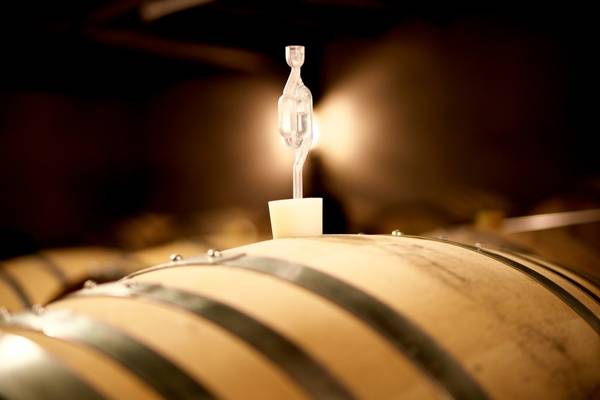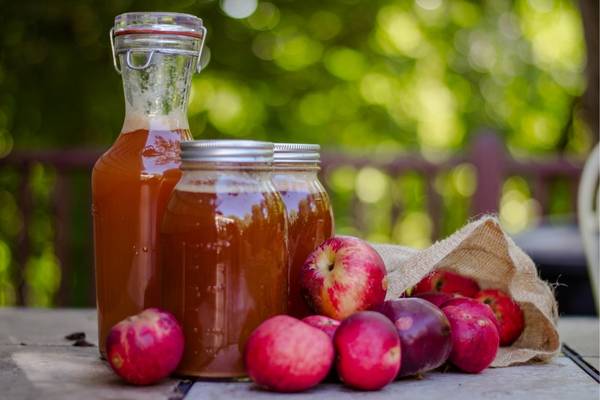Apple cider vinegar is a popular ingredient in many recipes, and it is also touted for its numerous health benefits. However, there is some confusion about whether or not apple cider vinegar contains alcohol.
The short answer is, no, apple cider vinegar is not supposed to contain significant amounts of alcohol. The acid in apple cider vinegar is converted from alcohol by acetic acid bacteria, so there may be residual alcohol left if the acetic acid fermentation did not go to completion. Typically this is no more than 0.5%.
To better understand this, let’s take a closer look at the production process, the health benefits of apple cider vinegar, and how it differs from alcoholic beverages.
In this blog post, we will explore this topic in depth and answer the question, does apple cider vinegar contain alcohol?
1. Apple cider vinegar is made from alcoholic cider
Apple cider vinegar is made from apples through a two-step process. First, the apples are crushed and pressed to extract the juice.
This juice is then fermented by exposing it to yeast and bacteria, which convert the natural sugars in the juice into alcohol.
In the second step, the alcohol is further fermented by a specific type of bacteria called Acetobacter.
These bacteria convert the alcohol into acetic acid, which gives apple cider vinegar its characteristic tartness and pungent smell.

The (bio)chemical reaction above shows how ethanol is converted in a two-step process by Acetobacter bacteria into acetic acid (vinegar).
This process is a so-called “oxidation” reaction (you can see from the reaction that oxygen is added one at a time!), meaning that it requires oxygen to take place.
This is why wine or cider might turn sour if the bottle closing mechanism isn’t tight enough!
2. The role of fermentation in vinegar production
Fermentation is a natural process that occurs when microorganisms, such as yeast and bacteria, break down complex molecules like sugar into simpler compounds like alcohol and carbon dioxide.

This process is essential for the production of many foods and beverages, including bread, yogurt, and alcoholic beverages like beer and wine. In the case of apple cider vinegar, the fermentation process is responsible for converting the sugars in apple juice into acetic acid, which is the primary component of vinegar.
3. Trace amounts of alcohol in apple cider vinegar
While the primary goal of fermentation in apple cider vinegar production is to convert the alcohol into acetic acid, it is possible for trace amounts of alcohol to remain in the final product.
This is because the conversion process may not be 100% efficient. However, the amount of alcohol present in apple cider vinegar is typically less than 0.5%, which is considered non-alcoholic by most standards.
This amount is typically higher if less oxygen was present during the acidification process.
4. The differences between apple cider vinegar and Hard apple cider
Hard apple cider, also known as alcoholic apple cider, is a fermented beverage made from apples.
It contains a higher alcohol content than apple cider vinegar, typically ranging from 4-6%. The primary difference between the two is the fermentation process.

Apple cider vinegar is a non-alcoholic vinegar primarily used in cooking and known for its sour taste, while hard apple cider is an alcoholic beverage enjoyed for its range of flavors and consumed in a similar manner to beer or wine.
So, it is clear that apple cider vinegar and hard apple cider are two distinct products that are made from apples, but they have different purposes and characteristics.
Here are the main differences between apple cider vinegar and hard apple cider:
- Production Process:
- Apple Cider Vinegar: Apple cider vinegar is made by fermenting apple cider. First, fresh apple juice is extracted from crushed apples. Then, yeast is added to the juice to convert the sugars into alcohol through fermentation. The alcohol is further fermented by acetic acid bacteria to produce vinegar.
- Hard Apple Cider: Hard apple cider is an alcoholic beverage made from fermented apple juice. Similar to apple cider vinegar, it starts with fresh apple juice, which is then fermented with yeast to convert the sugars into alcohol. The resulting liquid is a mildly alcoholic beverage.
- Alcohol Content:
- Apple Cider Vinegar: Apple cider vinegar is non-alcoholic or contains a negligible amount of alcohol, typically less than 0.5% by volume. The alcohol produced during fermentation is further metabolized into acetic acid, which gives vinegar its distinct sour taste.
- Hard Apple Cider: Hard apple cider, on the other hand, is an alcoholic beverage. It typically has an alcohol content ranging from 4% to 8% ABV (alcohol by volume), similar to beer.
- Flavor and Taste:
- Apple Cider Vinegar: Apple cider vinegar has a sharp, sour taste due to the presence of acetic acid. It is often described as tangy, acidic, and slightly fruity. The flavor can vary depending on the apples used and the fermentation process.
- Hard Apple Cider: Hard apple cider has a more complex flavor profile. It can range from sweet to dry, and the taste varies depending on the apple varieties used, the fermentation process, and any additional flavorings or additives.
- Culinary Uses:
- Apple Cider Vinegar: Apple cider vinegar is commonly used in cooking, baking, and salad dressings. It can add tanginess and acidity to dishes and is known for its potential health benefits, such as aiding digestion and regulating blood sugar levels.
- Hard Apple Cider: Hard apple cider is primarily consumed as an alcoholic beverage. It can be enjoyed on its own, similar to beer or wine, and can also be used in cocktails or as an ingredient in cooking and baking.
- Nutritional Composition:
- Apple Cider Vinegar: Apple cider vinegar is low in calories and does not provide significant nutrients in substantial amounts. It may contain some beneficial compounds like polyphenols and antioxidants.
- Hard Apple Cider: Hard apple cider contains calories and carbohydrates from the alcohol and residual sugars. It may also contain certain vitamins and minerals found in apples, although the amounts can vary depending on the specific cider.
In summary, the main differences between apple cider vinegar and hard apple cider lie in their production processes, alcohol content, flavor profiles, culinary uses, and nutritional compositions.
5. The health benefits of apple cider vinegar
Apple cider vinegar has been associated with numerous health benefits. Some of these benefits include:
- Improved digestion
- Lower blood sugar levels
- Increased satiety and weight loss
- Aiding in detoxification
- Balancing pH levels
It is important to note that many of these health benefits are anecdotal or have limited scientific evidence supporting them. However, apple cider vinegar is generally considered safe for consumption in moderation and can be a beneficial addition to a healthy diet.
6. The impact of alcoholic cider on health
While moderate alcohol consumption may offer some health benefits, excessive alcohol intake can lead to a range of adverse health effects, including liver damage, heart disease, and addiction. Additionally, alcohol is a source of empty calories, which can contribute to weight gain and obesity. Therefore, it is important to consume alcohol responsibly and in moderation.
7. Using apple cider vinegar in recipes
Apple cider vinegar is a versatile ingredient that can be used in a variety of recipes, including salad dressings, marinades, and sauces. Additionally, it can be used as a natural preservative or as a substitute for other types of vinegar or lemon juice. When using apple cider vinegar in recipes, it is important to remember that it has a strong flavor and should be used sparingly to avoid overpowering the dish.
8. Apple cider vinegar supplements
In addition to liquid apple cider vinegar, there are apple cider vinegar supplements available on the market. These supplements typically come in the form of capsules or tablets and are intended to provide the health benefits of apple cider vinegar in a more convenient form. However, there is limited evidence to support the effectiveness of apple cider vinegar supplements, and it is generally recommended to consume the liquid form for maximum benefits.
9. The safety of apple cider vinegar
Apple cider vinegar is generally considered safe for consumption in moderation. However, it is important to be aware of potential side effects and interactions with medications. Some potential side effects of apple cider vinegar include tooth enamel erosion, throat irritation, and digestive upset.
Additionally, apple cider vinegar may interact with certain medications, such as diuretics and insulin. If you have concerns about consuming apple cider vinegar, it is best to consult with a healthcare professional before incorporating it into your diet.
Conclusion
In conclusion, apple cider vinegar does not contain alcohol in any significant amount. While trace amounts of alcohol may be present due to the fermentation process, these levels are typically less than 0.5% and considered non-alcoholic. Here are 10 key facts about apple cider vinegar:
1. Apple cider vinegar is made from fermented apple juice.
2. The fermentation process converts sugar into alcohol and then into acetic acid.
3. Acetic acid gives apple cider vinegar its characteristic tartness and pungency.
4. Trace amounts of alcohol may be present in apple cider vinegar, but levels are typically below 0.5%.
5. Apple cider vinegar is different from hard apple cider, which contains higher alcohol content.
6. Apple cider vinegar has been associated with numerous health benefits, although many are anecdotal or have limited scientific evidence.
7. Apple cider vinegar can be used in a variety of recipes, including salad dressings, marinades, and sauces.
8. Apple cider vinegar supplements are available, but their effectiveness is unclear.
9. Apple cider vinegar is generally considered safe for consumption in moderation, but potential side effects and interactions should be considered.
10. If you have concerns about consuming apple cider vinegar, consult with a healthcare professional before incorporating it into your diet.
FAQs
What percentage of alcohol is in apple cider vinegar?
Apple cider vinegar typically does not contain alcohol, but there may be residual alcohol left if the acetic acid fermentation was incomplete. Typically no more than 0.5%.
Is apple cider a strong alcohol?
No, apple cider is not a strong alcohol. It typically contains less than 0.5% alcohol by volume, which is considered non-alcoholic.
Why does apple cider have alcohol?
Apple cider can have alcohol because it is made from fermented apples, which naturally contain yeast that converts the sugar in the juice into alcohol. The longer the fermentation process, the higher the alcohol content.
Is vinegar basically alcohol?
No, vinegar is not basically alcohol. While both alcohol and vinegar are produced through fermentation, alcohol is the result of fermenting sugar into ethanol, while vinegar is the result of fermenting ethanol into acetic acid.
Is apple cider naturally alcoholic?
Yes, apple cider can be naturally alcoholic if it is not pasteurized and allowed to ferment. The natural sugars in the apples can be converted into alcohol by yeast, resulting in an alcoholic apple cider. However, most commercially available apple cider is pasteurized and does not contain alcohol.
Does vinegar contain alcohol?
Yes, vinegar contains a small amount of alcohol. During the fermentation process, yeast converts sugar into alcohol, which then undergoes a second fermentation process to produce acetic acid, the main component of vinegar. However, the alcohol content in vinegar is very low, usually less than 0.5%.




